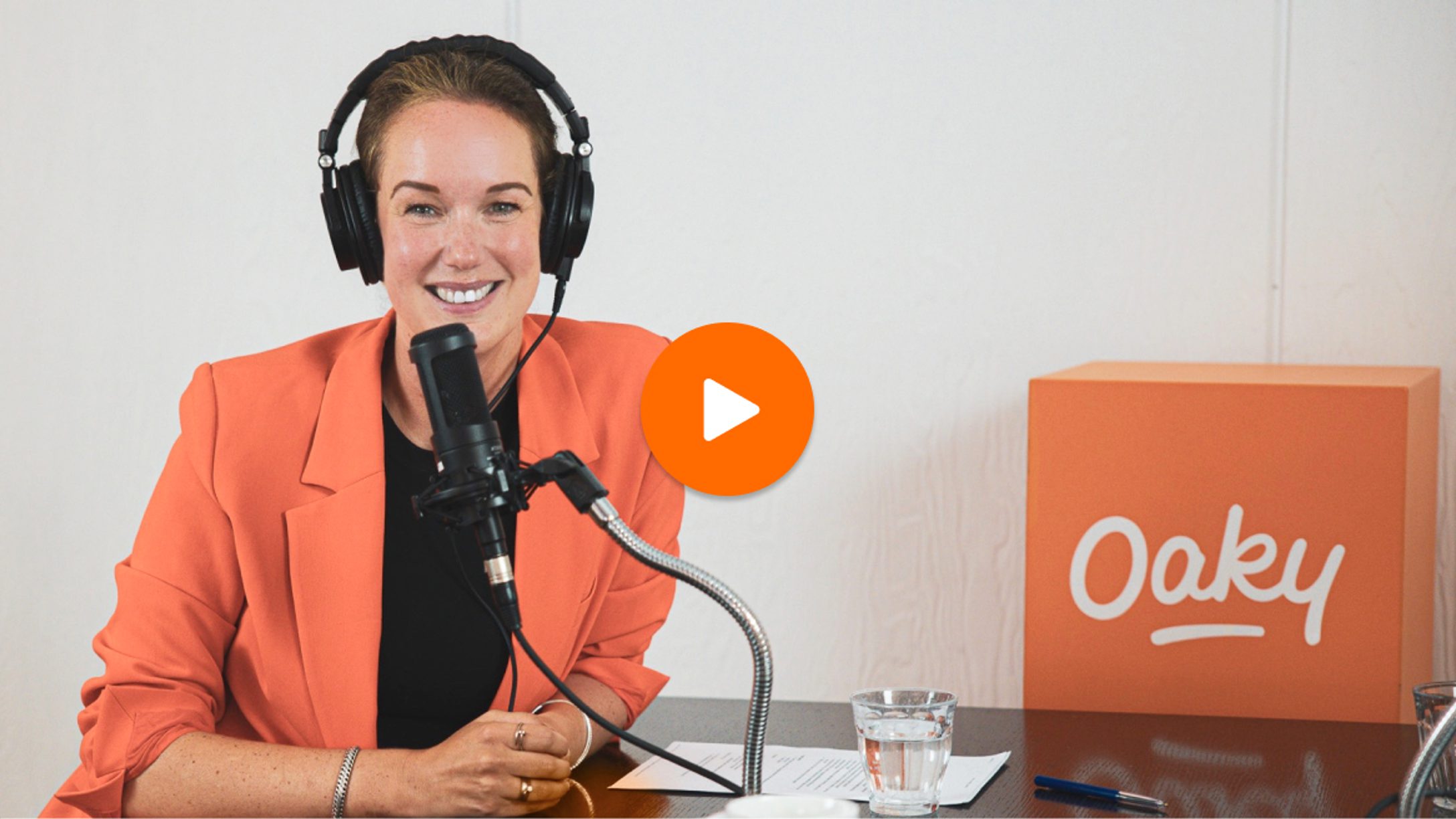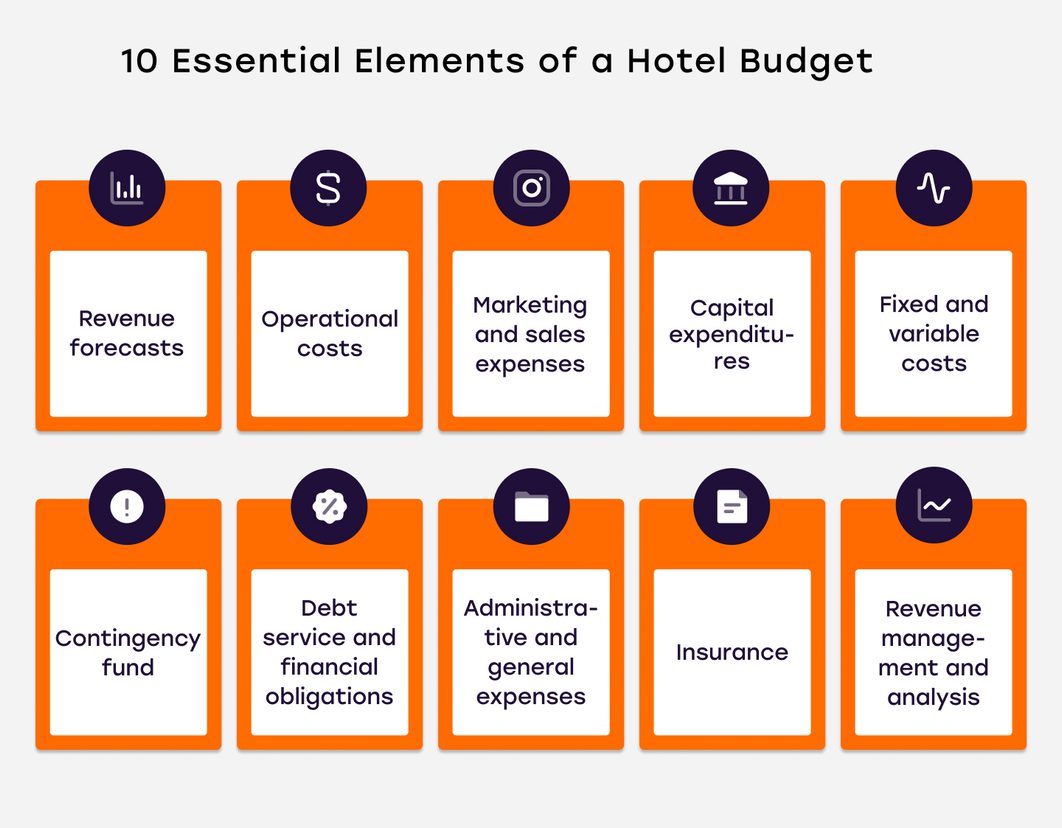Hotel budgeting and forecasting: Key steps and best practices for 2025
Oaky
•

A hotel budget is more than a spreadsheet to ensure your sales revenue can cover your fixed and variable expenses. It also serves as a strategic plan that can help hotel managers to meet their goals, irrespective of challenges like a dip in demand or an economic downturn.
Here’s an overview of the steps involved to ensure you’re ready for hotel budgeting season.
What is a hotel budget?
A hotel budget is a detailed financial plan outlining the projected revenues, expenses, and profit margins for a hotel over a fiscal year. It serves as a roadmap for managing the hotel's financial resources and helps in setting financial goals, controlling costs, and optimizing revenue. These numbers help hotel managers to allocate resources efficiently and plan for the next year.
A hotel has several operational, capital, marketing, and other types of expenses it needs to meet. These include:
Salaries
Utilities
Cleaning products and laundry
Taxes and insurance
Renovations
In-room amenities
Office supplies
Website hosting and maintenance
OTA fees
Software subscriptions
All in all, proper hotel budgeting is crucial for revenue managers to ensure a healthy financial performance in the upcoming year.

Why is a hotel budget important?
Without a hotel budget, maintaining a hotel’s financial health becomes impossible.
Firstly, you need to forecast room revenue, which is difficult to do in the hotel industry where demand fluctuates. This enables hotel management to set realistic revenue targets and adjust strategies in response to market trends and economic conditions.
Secondly, it helps with managing operational costs and ensuring that resources are allocated efficiently across different departments. This exercise helps hotels prevent overspending.
Thirdly, with a hotel budget, management has a means to monitor financial performance. If it picks up that it’s underperforming, it can use it as a roadmap to get it back on track and prevent the hotel from failing to meet its financial and strategic goals completely.
How do you forecast a hotel budget?
Budget forecasting is complex. You need to analyze multiple factors and take into account many elements like historical hotel data, market trends, and current economic conditions.
To make accurate revenue projections, hotel managers must gather data on:
Past performance
Room bookings
Other revenue streams.
While operating costs such as labor, utilities, and supplies are calculated, key revenue streams like rooms, food & beverage, and ancillary services are estimated based on historical data and other factors. Let’s take a closer look at the factors one needs to consider when preparing a hotel budget.
What are the key factors influencing a hotel budget?
Hotel budget factors refer to the external or internal influences that affect how your budget is created or adjusted. They are the variables that can impact the financial planning process:
Economy and market trends: Changes in the hospitality industry, such as shifts in traveler behavior or economic downturns can significantly impact revenue projections and budget allocations. For example, broader economic trends, like inflation or recessions, can affect guest spending and a hotel’s overall financial performance.
Occupancy rates: Upcoming events in the area, like festivals or concerts, may impact projected occupancy positively. Though, if the event is a competitor hotel opening in the area, room revenue can be impacted negatively.
Fixed and variable costs: Understanding the balance between fixed and variable costs is essential for accurate budgeting and resource allocation. Fixed costs remain constant, while variable expenses may change based on occupancy levels and other factors. For example, your monthly insurance premium isn’t going to lower if you attract fewer guests that month. However, you’ll probably find that you’ll spend less on cleaning supplies during low-season periods.
Capital expenditures: Investments in property improvements such as renovation, new equipment, or technology upgrades can have a significant impact on the budget. While these expenses typically happen only every few years, they add up to large sums.
Competitor activity: Pricing strategies and offerings from competitor hotels or new hotels opening nearby can impact market share and force adjustments in rates or services.
Regulatory requirements: Changes in taxes, labor laws, health and safety regulations can lead to additional costs, and, hence, affect your hotel budget.
What are the key elements of a hotel budget?
Hotel budget elements refer to the specific line items or components that make up the hotel’s financial plan. They are the building blocks of the budget, outlining where income and expenses are allocated.
By incorporating these components into your planning, you can ensure that all financial aspects of the hotel’s operations are comprehensively planned and managed.

Here's a breakdown of the key components to consider when creating your budget:
1. Revenue forecasts
Typically, the process starts with forecasting occupancy rates and room revenue. Other departments build their projections based on this initial data.
Room revenue: Projections based on anticipated occupancy rates, average daily rate (ADR), and room types. This includes revenue from different room categories and potential upselling.
Food and beverage revenue: Income expected from on-site restaurants, bars, room service, and event catering. This also includes projections for special events or functions hosted by the hotel.
Other revenue streams: Additional sources of income such as spa services, parking fees, conference room rentals, and retail sales.
2. Operational costs
The operational costs typically make up the biggest percentage.
Staffing costs: Salaries, wages, benefits, and training expenses for all hotel staff, including front desk, housekeeping, maintenance, and management.
Utilities: Costs for electricity, water, gas, heating, cooling, and internet services.
Supplies and inventory: Expenses for daily operational needs such as cleaning supplies, guest amenities, and kitchen ingredients.
3. Marketing and sales expenses
A good hotel marketing strategy relies on combining paid and unpaid marketing strategies like word-of-mouth marketing.
Advertising: Costs associated with promoting the hotel through various channels, including digital marketing, print ads, and social media campaigns.
Sales promotions: Budget for discounts, special offers, and loyalty programs aimed at attracting and retaining guests.
Public relations: Expenses related to managing the hotel’s image and handling media relations.
4. Capital expenditures
When listing your capital expenses, ensure that you keep sight of the bigger picture. Calculating the ROI that this big expense can generate will make it easier to get the budget approved.
Property improvements: Budget for renovations, upgrades, and refurbishments of the hotel property, including rooms, lobbies, and common areas.
Furniture, fixtures, and equipment (FF&E): Costs for purchasing or replacing furniture, fixtures, and equipment essential for hotel operations.
Technology upgrades: Investments in new technology such as a property management system (PMS), booking engines, and digital guest services e.g. digital hotel kiosks.
5. Fixed and variable costs
Variable costs are more difficult to budget than fixed costs. Let your forecasted occupancy rates guide you as well as market trends. If you know that a price increase is on the cards for certain items, you can plan accordingly so long.
Fixed costs: Regular, predictable expenses that do not change with occupancy levels, such as salaries, property taxes, and insurance.
Variable costs: Expenses that fluctuate based on occupancy and business activity, including utilities, guest supplies, and food and beverage costs.
6. Contingency fund
If you treat your contingency fund as an expense, you’ll be prepared for unexpected expenses.
Emergency reserve: Funds set aside for unexpected expenses or financial shortfalls, ensuring the hotel can manage unforeseen issues without disrupting operations.
7. Debt service and financial obligations
Even with good financial planning, you’ll have loan obligations. These are important to meet as they can impact your credit score.
Loan payments: Repayment of principal and interest on loans used for financing the hotel.
Leases: Costs associated with leasing equipment, vehicles, or other necessary assets.
8. Administrative and general expenses
While calculating these expenses aren't as exciting as creating marketing budgets, they’re needed to ensure smooth operation.
Office supplies: Costs for administrative materials and office operations.
Legal and professional fees: Expenses for legal services, accounting, and consulting.
9. Insurance
Insurance is an unavoidable fixed expense to protect your hotel business.
Property insurance: Coverage for damage to the building and contents.
Liability insurance: Protection against claims related to accidents or injuries.
Workers’ compensation: Insurance for employee-related injuries and illnesses.
10. Revenue management and analysis
Pricing strategies: Plans for room rates and discounts based on market demand, competition, and historical data.
Performance metrics: Tracking key performance indicators (KPIs) such as occupancy rates, average daily rate (ADR), and revenue per available room (RevPAR) to assess financial health and make data-driven decisions.

What are the steps in the hotel budgeting process?
As many of your decisions for the next year will be based on your hotel budget, it’s crucial that you approach it diligently. Here are the key steps to take to ensure accurate numbers.
1. Gather data
Much of your financial decisions will be based on data, making this first step critical. You’ll need to collect historical data on:
Revenue
Expenses
Occupancy rates
You’ll use this data to identify patterns and trends that can inform future budgeting decisions.
2. Set revenue targets
Based on historical data and market trends, set realistic revenue targets for each department, including room bookings, food and beverage, and other services. For example, if your current economic climate is less favorable for leisure travel, your revenue target for the year will likely be lower than the previous year’s performance. While the goal is to grow and generate more revenue each year, goals should remain realistic and attainable.
3. Estimate expenses
Categorize expenses into fixed and variable costs. As mentioned above, fixed costs include salaries, property taxes, and insurance, while variable expenses cover utilities, marketing, and guest supplies.
It’s also important that each year’s hotel budget includes capital expenditures. These include costs like major renovations or purchases such as a generator. While hotel budgets focus on short-term forecasts, hotel management must keep sight of long-term needs too, and plan accordingly.
4. Allocate resources
Use the operational needs and revenue potential of each department as a guideline and allocate funds accordingly. This means that you need to check that the marketing budget, capital expenditures, and operational costs are proportionate to the expected revenue that it will generate.
5. Review and adjust
Before the hotel budget can be finalized and implemented, it needs to be presented to different levels of management. This exercise empowers hotels to make adjustments to address any discrepancies.
6. Finalize and implement
Once all the adjustments suggested by senior management have been incorporated, you can finalize the budget. Share the individual departmental budgets with the relevant stakeholders and double-check that they understand the requirements and the hotel’s strategic objectives.
When is the hotel budget season?
Hotel budget season typically occurs a few months before the start of the fiscal year, often in the final quarter. However, it can also start earlier. Also, keep in mind that time needs to be allocated for when it will be presented to different management teams.
For example, according to Gaby Maaswinkel-vd Bosch, Associate Director of Revenue Management for the Netherlands with Radisson Hotel Group, a budgeting process starts in June at Radisson Hotels. It usually lasts till November when the budget is finally approved and locked.
Who should be involved in the budgeting process?
Collaboration between departments is paramount for creating a robust hotel budget. Both Gaby Maaswinkel-vd Bosch and David Lund, “The Hotel Financial Coach”, stress the importance of having all department leaders involved in the budget creation process. This includes the:
Front office manager
Guest services manager
Housekeeping/rooms manager
Maintenance manager
Chef
Manager of every outlet on the property (food & beverage, spa, golf, etc.)
People/HR director
Sales leader
Marketing leader.
Who approves the hotel budget?
After the budget is prepared and presented initially, it’s ultimately approved by the owner of the hotel. For branded hotels, the brand approves the budget first and then ownership does.
How do hotels budget for new technology and solutions?
According to Gaby Maaswinkel-vd Bosch, leveraging technology is a no-brainer for hotels. In fact, hotels have a need for different solutions, making careful budget planning even more important.
To help hotels budget for new technology, she suggests they consider the following factors:
The ROI new technology can generate
User-friendliness
Hours it can save (which might be more difficult to calculate precisely)
Innovation behind it
Pricing (if there are multiple solutions providing the same service).
Another important factor is integration. As hotel chains typically need and use a multitude of different solutions, it’s crucial that systems integrate and communicate with each other to avoid adding extra workload on the team’s shoulders.
Hotel budget tips from an expert
Here are Gaby Maaswinkel-vd Bosch’s three practical tips for effective hotel budgeting:
1. Overprepare
This is especially important if you’re creating the hotel’s budget for the first time. Ensure that you know the market of your hotel inside out.
2. Communicate with all stakeholders
Revenue managers should speak to all stakeholders like general managers. They have valuable information that’s required for creating budgets. This way, you can also get their buy in, helping to streamline the process.
3. Look at ratios
Ratios need to make sense from a segmentation perspective.
For example, if you’re predicting more room bookings this year, you’ll need to increase other numbers accordingly. More room bookings will mean various revenue streams like breakfast revenue can also be adjusted upwardly.
This applies to the hotel operating expenses too. For example, if you expect more guests, your budget for cleaning supplies will need to be bigger.
One number can impact multiple other values.
Final thoughts
Ideally, hotel revenue should increase each year. Keep it realistic and aim for average revenue gains. Basically, you want to set realistic revenue growth challenges.
To do this, you’ll need to keep your finger closely on the pulse of the lodging industry. Study market trends carefully and plan accordingly.
While you need to base your decisions on data, you might also need to apply some creative thinking to find ways to cut customer acquisition costs, for example.

